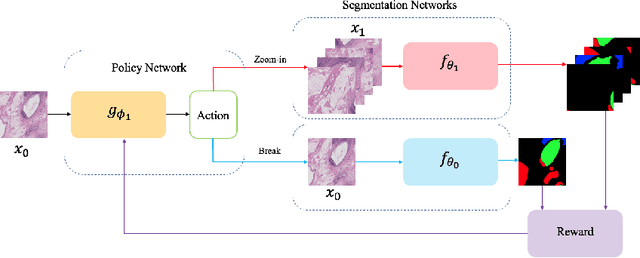Reinforced Auto-Zoom Net: Towards Accurate and Fast Breast Cancer Segmentation in Whole-slide Images
Paper and Code
Jul 29, 2018



Convolutional neural networks have led to significant breakthroughs in the domain of medical image analysis. However, the task of breast cancer segmentation in whole-slide images (WSIs) is still underexplored. WSIs are large histopathological images with extremely high resolution. Constrained by the hardware and field of view, using high-magnification patches can slow down the inference process and using low-magnification patches can cause the loss of information. In this paper, we aim to achieve two seemingly conflicting goals for breast cancer segmentation: accurate and fast prediction. We propose a simple yet efficient framework Reinforced Auto-Zoom Net (RAZN) to tackle this task. Motivated by the zoom-in operation of a pathologist using a digital microscope, RAZN learns a policy network to decide whether zooming is required in a given region of interest. Because the zoom-in action is selective, RAZN is robust to unbalanced and noisy ground truth labels and can efficiently reduce overfitting. We evaluate our method on a public breast cancer dataset. RAZN outperforms both single-scale and multi-scale baseline approaches, achieving better accuracy at low inference cost.
 Add to Chrome
Add to Chrome Add to Firefox
Add to Firefox Add to Edge
Add to Edge